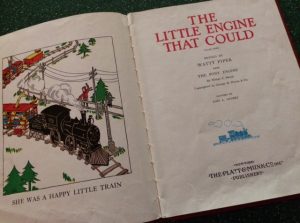Tag: self esteem
Your Little Engine
On my recent visit to Kuwait, a smiling woman named Alaa Alothman came up to me while I was autographing books and asked something that stopped me in my tracks.
“You say that many books have influenced you throughout your life,” she began, “so I am curious what children’s book had an impact on you?”
I looked up and just stared at her.
“What a truly great question,” I announced. “I’ve never been asked that before.”
I hadn’t, either.
I went on to tell her that I’d have to think about it, as it was something I never considered.
It truly made me think.
After all, what children’s book did I read almost 60 years ago?
We talked for a few moments while my mind searched my memory banks for an answer.
And then it dawned on me.
“You know, it may sound simple, but I think The Little Engine that Could was probably the first book that inspired me as a child. I vaguely remember my mother reading it to me in the 1950s.”
Alaa smiled big, nodding her recognition of the famous book.
“The book was about an engine and my father worked on the railroad,” I said. “And the message was about believing in yourself, which I soaked up. It was probably the first self-help book I ever discovered.”
After the event in Kuwait, I became curious about the famous children’s book.
Turns out the story of the positive self-talking little engine goes back to at least 1906.
The first known use of the story is attributed to Rev. Charles S. Wing, who probably didn’t originate the story but delivered it to his congregation in Brooklyn in 1906.
It went like this:
In a certain railroad yard there stood an ex tremely heavy train that had to be drawn up an unusually heavy grade before it could reach its destination. The superintendent of the yard was not sure what it was best for him to do, so he went up to a large, strong engine and asked :
“Can you pull that train over the hill?”
“It is a very heavy train,” responded the en gine.
He then went to another great engine and asked:
“Can you pull that train over the hill?”
“It is a very heavy grade,” it replied.
The superintendent was much puzzled, but he turned to still another engine that was spick and span new, and he asked it:
“Can you pull that train over the hill?”
“I think I can,” responded the engine.
So the order was circulated, and the engine was started back so that it might be coupled with the train, and as it went along the rails it kept repeating to itself: “I think I can. I think I can. I think I can.”
The coupling was made and the engine began its journey, and all along the level, as it rolled toward the ascent, it kept repeating to itself: “I —think —I can. I —think —I— can. I —think— I —can.”
Then it reached the grade, but its voice could still be heard: “I think I can. I—– think—–I—–can. I —–think—– I—– can.”
Higher and higher it climbed, and its voice grew fainter and its words came slower:
“I ——-think ——–I——-can.”
It was almost to the top.
“I ———think”
It was at the top.
“I ———can.”
It passed over the top of the hill and began crawling down the opposite slope.
‘I ——think——- I—— can——I—– thought——I——-could I—– thought—– could. I thought I could. I thought I could. I thought I could.”
And singing its triumph, it rushed on down toward the valley.
But the best known version of the story is the book, The Little Engine that Could, published in 1930 and attributed to Watty Piper, the pen name of the publisher, Arnold Munk.
No one knows with any agreed certainty who actually originated the story.
That little story about “I think I can…I think I can…” influenced many, including me.
What children’s book influenced you?
Ao Akua,
joe
PS –My new book, The Secret Prayer, will be available soon. You can hear the actual prayer online, for free, by clicking right here.





